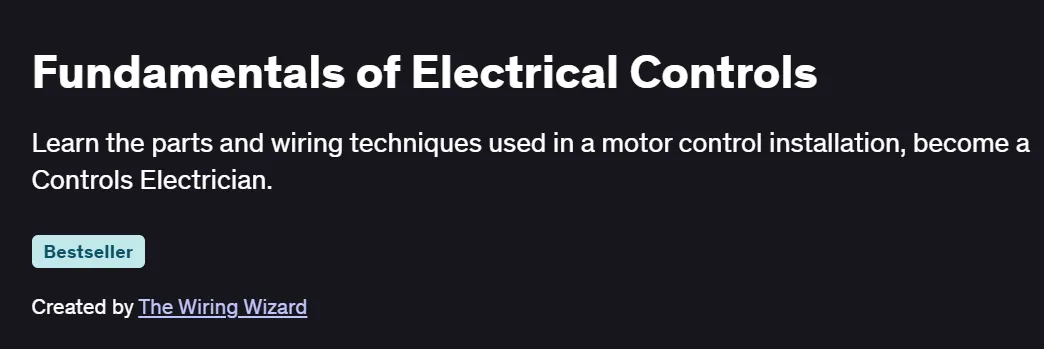What will you in Fundamentals of Electrical Controls Course
Understand the basic principles of electrical control systems and their components.
Learn how relays, sensors, and switches are used to control machinery and circuits.
Read and interpret electrical schematic diagrams with confidence.
Build and troubleshoot basic control circuits for industrial and commercial use.
Gain practical knowledge to advance into PLCs, automation, or electrical maintenance roles.
Program Overview
Module 1: Introduction to Electrical Controls
⏳ 30 minutes
Overview of control systems and their applications.
Key terms and the role of electrical controls in automation.
Module 2: Control System Components
⏳ 60 minutes
Introduction to relays, contactors, sensors, and switches.
Explanation of NO (Normally Open) and NC (Normally Closed) logic.
Module 3: Wiring & Control Logic
⏳ 60 minutes
How to wire and connect components in basic circuits.
Understanding latching, interlocking, and logic sequences.
Module 4: Reading Schematic Diagrams
⏳ 45 minutes
Standard electrical symbols and how to follow a wiring diagram.
Practice examples of motor control circuits and interlocks.
Module 5: Building Basic Control Circuits
⏳ 60 minutes
Step-by-step demos: start/stop, reversing, and overload protection circuits.
Hands-on troubleshooting techniques.
Module 6: Safety & Industry Applications
⏳ 30 minutes
Best practices for safety when working with electrical systems.
Real-world examples from manufacturing and HVAC systems.
Module 7: Pathways for Continued Learning
⏳ 30 minutes
Next steps: PLCs, industrial automation, and advanced electrical certifications.
Resources for further technical development.
Get certificate
Job Outlook
High Demand: Electrical control systems knowledge is vital in manufacturing, automation, and facility maintenance.
Career Advancement: Supports progression into roles like Control Technician, Electrical Maintenance Engineer, or PLC Programmer.
Salary Potential: Entry-level control technicians earn $50K–$75K, with experienced professionals exceeding $90K.
Freelance Opportunities: Electrical troubleshooting and circuit design are valued freelance services in industrial and commercial settings.
Specification: Fundamentals of Electrical Controls
|





